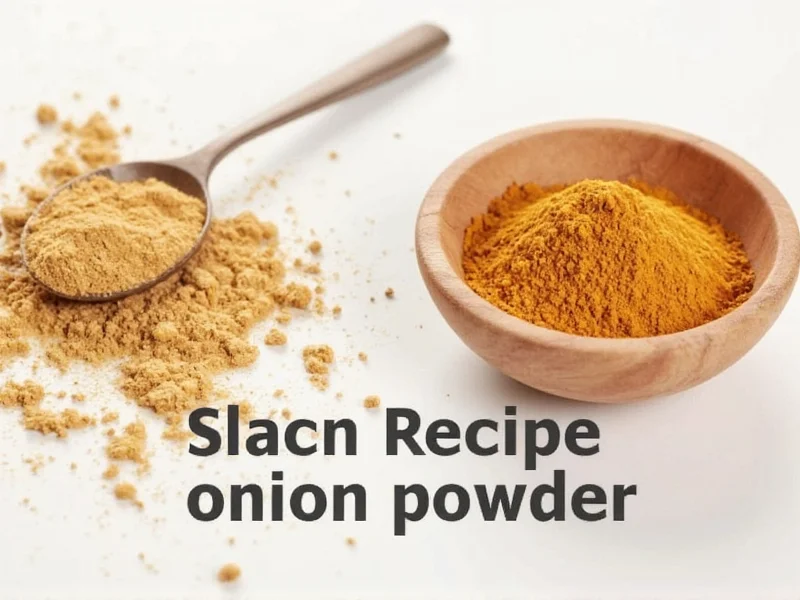The best alternatives for onion powder include fresh onions (use 1/4 cup minced onion per 1 tsp powder), onion flakes (1 tbsp flakes = 1 tsp powder), shallots (milder flavor, same ratio), or a combination of garlic powder and celery salt. For low-FODMAP diets, chives or infused oils work well. Each substitute varies in intensity and moisture content, so adjust liquid ingredients accordingly when baking or cooking.
When you're in the middle of preparing a recipe and realize you've run out of onion powder, knowing reliable alternatives can save your dish. Onion powder provides concentrated onion flavor without moisture, making it valuable in spice blends, rubs, and dry mixes. Understanding proper substitutions ensures your culinary creations maintain the intended flavor profile while accommodating dietary needs or ingredient availability.
Top Onion Powder Substitutes Ranked by Effectiveness
Not all substitutes work equally well in every application. The right choice depends on your specific recipe requirements, dietary restrictions, and flavor preferences. Here's a detailed comparison of the most effective alternatives:
| Substitute | Conversion Ratio | Best For | Flavor Notes |
|---|---|---|---|
| Fresh yellow onion | 1/4 cup minced = 1 tsp powder | Sauces, stews, moist dishes | Stronger fresh flavor, adds moisture |
| Onion flakes | 1 tbsp = 1 tsp powder | Dry rubs, spice blends | Closest match, rehydrates during cooking |
| Shallots | 2 tbsp minced = 1 tsp powder | Delicate sauces, dressings | Milder, sweeter, more complex flavor |
| Garlic powder + celery salt | 1/2 tsp garlic powder + 1/4 tsp celery salt = 1 tsp onion powder | Emergency substitute | Similar savory profile but distinct flavor |
| Leeks (white part) | 3 tbsp minced = 1 tsp powder | Creamy soups, delicate dishes | Milder, sweeter, less pungent |
Fresh Onions: The Most Accessible Alternative
Fresh onions serve as the most readily available onion powder alternative in most kitchens. Yellow onions provide the closest flavor match to standard onion powder. When substituting fresh onions for powder, remember that 1/4 cup of finely minced onion equals approximately 1 teaspoon of onion powder. This conversion accounts for both flavor concentration and moisture content.
For best results when using fresh onions as an onion powder replacement:
- Finely mince or grate the onion to maximize surface area
- Sauté briefly to mellow the raw flavor (especially important for baking)
- Reduce other liquids in the recipe by 1-2 tablespoons per substitution
- Use only the white and light green parts for most applications
This fresh onion vs onion powder conversion works particularly well in soups, stews, and meatloaf where additional moisture won't compromise texture. However, for dry rubs or spice blends, consider draining excess liquid after sautéing.
Specialized Alternatives for Dietary Restrictions
Certain dietary needs require specific onion powder alternatives. Understanding these specialized substitutes ensures everyone can enjoy flavorful cooking regardless of restrictions.
Low-FODMAP Options
For those following a low-FODMAP diet to manage IBS symptoms, standard onion alternatives won't work. Instead, try:
- Chives: Use 2 tablespoons fresh chives per 1 teaspoon onion powder
- Green onion tops: Only the dark green parts (1/4 cup minced = 1 tsp powder)
- Asafoetida (hing): 1/8 teaspoon asafoetida powder = 1 tsp onion powder (use sparingly)
- Onion-infused oil: Sauté onion in oil, then remove solids (retains flavor without FODMAPs)
Gluten-Free and Keto-Friendly Substitutes
Most onion powder alternatives naturally fit gluten-free and keto diets, but watch for:
- Commercial onion salt (often contains anti-caking agents with gluten)
- Pre-made spice blends that may include fillers
- Dehydrated onion products with added sugars
For strict keto diets, limit fresh onion quantities as they contain more carbohydrates than powdered form. Stick to 1-2 tablespoons of fresh onion per substitution to maintain ketosis.
Flavor Profile Considerations for Perfect Substitution
Understanding how each alternative affects your dish's flavor profile prevents disappointing results. Onion powder delivers consistent, concentrated onion flavor without moisture. When selecting an alternative for onion powder, consider these flavor dynamics:
- Intensity: Fresh onions provide more variable intensity depending on variety and freshness
- Sweetness: Shallots offer more sweetness; red onions provide sharper notes
- Aftertaste: Garlic powder combinations leave distinct garlic notes
- Heat stability: Powdered forms withstand high heat better than fresh alternatives
For baking applications requiring onion powder alternatives, dehydrated options work best. Onion flakes rehydrate during baking, providing consistent flavor without altering dough consistency. When making breads, biscuits, or savory pastries, use 1 tablespoon of onion flakes per teaspoon of powder called for in your recipe.
Homemade Onion Powder Replacement Guide
Creating your own onion powder substitute ensures freshness and avoids additives. This process works well when you have surplus onions or want control over your ingredients:
- Peel and thinly slice 2 large yellow onions
- Dehydrate at 135°F (57°C) for 6-8 hours until completely brittle
- Grind in spice grinder until fine powder forms
- Sift through fine mesh to remove larger pieces
- Store in airtight container away from light
This homemade onion powder replacement maintains maximum flavor compounds. For immediate use when you need an onion powder alternative right now, finely mince fresh onion and sauté until dry before incorporating into your recipe. This quick method concentrates the flavor while removing excess moisture.
When to Avoid Certain Substitutes
Not all alternatives work equally well across cooking applications. Understanding these limitations prevents recipe failures:
- Avoid fresh onions in dry spice rubs for meats (causes steaming instead of searing)
- Don't use strong substitutes like garlic powder in delicate fish dishes
- Limit shallots in high-heat applications (burn more easily than yellow onions)
- Avoid leeks in recipes requiring strong onion flavor (too mild)
For salad dressings requiring onion powder alternatives, shallots provide the most balanced flavor. Their milder profile won't overwhelm delicate vinaigrettes while still delivering that essential onion note. Use 1 tablespoon of finely minced shallot per teaspoon of powder called for in your dressing recipe.











 浙公网安备
33010002000092号
浙公网安备
33010002000092号 浙B2-20120091-4
浙B2-20120091-4